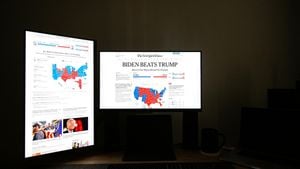The New College of Florida finds itself at the center of controversy as hundreds of books, particularly those covering LGBTQ+ issues and gender studies, were dumped outside its library. These actions align closely with Florida Governor Ron DeSantis' broader conservative agenda aimed at reshaping educational institutions across the state.
Reports indicate the books were marked for discard and included titles such as "Nine and Counting: The Women of the Senate" and "When I Knew," which gathers accounts of LGBTQ+ individuals' personal experiences. This sparked outrage among students and faculty who observed the removal of materials pertinent to diversity and inclusion.
Photos of the situation, as covered by the Sarasota Herald-Tribune, depict dumpsters overflowing with literature from the now-closed Gender and Diversity Center. The college failed to provide students with opportunities to claim the books before their disposal, raising concerns about transparency and censorship.
Students at the college had previously been allowed to purchase books slated for removal, leading to questions about the sudden change in policy. Under current Florida law, state-funded institutions cannot donate books purchased with taxpayer money, which has complicated matters.
Amy Reid, who serves as the faculty chair and represents the board of trustees, criticized the book disposal, asserting it was akin to throwing away democracy itself. Reid expressed her desire for the academic community to observe a mourning period for the discarded materials, emphasizing their importance.
The book dump coincides with the college's preparations for the fall semester and the arrival of new students. Meanwhile, New College continues to navigate the fallout from DeSantis's restructuring efforts, which have included the abolition of its gender studies program after conservative trustees were appointed.
This drastic change at New College is viewed as just one example of DeSantis's campaign against programs he perceives as promoting “wokeness.” The school has undergone significant alterations under his administration, from leadership changes to the removal of diversity-focused initiatives.
Much of the content targeted under DeSantis's policies concerns race, gender, and sexuality. The education reforms linked to his administration have drawn both national attention and fervent criticism from various corners of the academic community.
Not only does this incident reflect censorship on campus, but it also aligns with legislative moves made by Florida lawmakers to restrict discussions of gender and sexuality education. Further complications arose as the federal Department of Education began investigating complaints claiming these changes discriminated against disabled and LGBTQ+ students.
Student enrollment at New College has become mixed; some students have left, disenchanted by the conservative shift. Yet, overall numbers show new students enrolling, perhaps due to lowered admission standards as the school attempts to bolster enrollment amid the turmoil.
Critics argue the situation reflects wider patterns of censorship and exclusionary practices across educational institutions in Florida. Amy Reid’s comments capture the essence of the students’ and faculty's sentiments as they face the repercussions of sweeping policy changes.
With DeSantis’s administration continuing to push for reforms across educational institutions, the situation at New College serves as an alarming glimpse of how such policies may play out. The fate of the library’s books stands as emblematic of larger struggles surrounding academic freedom, diversity, and inclusion.
The public is now left wondering about the future of education under these new guidelines and how they will affect students’ access to diverse literature. The situation continues to evolve, inviting fresh scrutiny and responses from both supporters and critics of the current administration's policies.
Educational institutions are increasingly becoming battlegrounds for cultural and political conflicts, with libraries and curricula at the forefront. The story from New College of Florida encapsulates the tensions prevalent within these debates, illustrating the significant stakes involved for voters and future educators alike.



